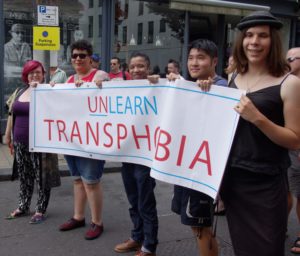Racism, sexism, ableism. All these –isms define our world today, and college campuses are not excluded. Emma Roberts and Beyoncé voice the feminist movement of the moment, while Laverne Cox has helped drive awareness for the transgender community. Even with schoolwork and friends, the typical student can find time to get involved on campus. Why not make a difference?

I went to visit my friend at Scripps College in California this week. She’s involved in DIDA (Disability, Illness, and Difference Alliance), a campus group that focuses on the issues facing people living with disabilities. This topic was new to me as was the group. I met wonderful new people and heard stories from students I couldn’t dream up even in my “writer’s mind.” The student-run group showed me a whole new world in just one meeting. With a little how-to, you too can find an inspiring cause on campus.
Show up
This seems obvious—but it’s not. How many posters for different campus groups have you passed by and ignored? How many meetings have you missed? How many groups do you not even know exist? Go out and search for something totally new. Surprise yourself. If all else fails, pick the poster with the catchiest slogan or the one with that dude you’ve been eyeing all semester. You never know, you might find your cause, or at least a date.
Pay attention to ground rules

These types of groups are rooted in a movement. Yes, they have pre-games. Yes, they have a sub-hookup-culture. But at the end of the day, these groups are looking to accomplish something during their time on campus. When a group discussion begins with “Please introduce yourself with your name, class and preferred gender pronouns,” do it. Also, it may help to understand why someone would ask to be referred to as “they” or “Ze” (don’t misgender people—that’s just bad group etiquette). And while you’re at it, read up about all types of trans-friendly diction.
Take something from the meeting

Since my trip to California, I’ve been trying to stop using ableist words like crazy, dumb or stupid. These words can be offensive to those who live with physical or mental disabilities. I urge you to do the same. But why mention it? Because I learned it from joining a group. Use group participation to branch out and learn something unexpected. Don’t limit your learning to class time. These groups aim for you to interact with your peers and to spread the knowledge. Channel Thoreau, Hawthorne and Emerson for the night and be an intellectual.
Pass on the knowledge

I’m not saying that you should go and be the president of every group you join — not all of us can be that perfect (I can barely make it to class). Be an active sponsor for your passions. Whether you choose a group centered on queer, disabled, racial minorities or a group focused on making that train ride to the club on Saturdays a little cheaper, own it.
Tell people about your cause. Convince the world you are right and your cause is worthwhile. Why go to meetings if you’re not going to publicize the hell out of your group? You should go make everybody understand why your life is now defined by being part of something bigger.



















